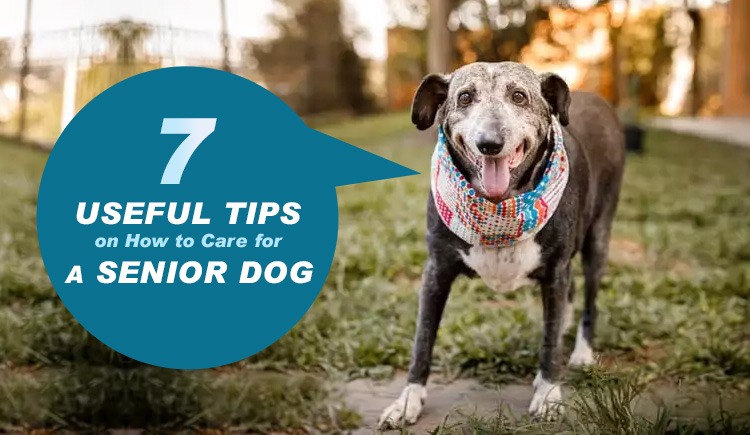
Aging is a natural process, and everyone gets old at some point of time in their life. As humans, dogs also have different requirements as they grow old.
But with proper care and treatments, aged dogs can too live a healthy and happy life. Old dogs have difficulties in moving and hearing, they develop weak vision, and eventually, their organs also stop working properly. They also become more susceptible to various diseases and ailments, like kidney or liver disease, diabetes, and obesity.
Not all dogs get old at the same age; different dog breeds show signs of aging at different ages and each breed has unique traits of seniority. Small dog breeds get old at the age of 10 to 11 years, medium-sized dog breeds are considered senior at the age of 8 to 10 years, and large dog breeds become old at an early age of 5 to 6 years.
In the next section of the blog, we will explore some useful tips to take care of your senior dogs.
How to take care of a senior dog
You will have to do a few things differently to keep your senior dog healthy. To help you do that we have shared some tips to take care of your senior dog.
1. Age-appropriate Healthy Diet
You would surely be tempted to pamper your pet more in their old age, but what is more important is to give them a balanced and healthy diet. Too much increase in calorie intake at this age will result in weight gain, leading to a decrease in your dog’s quality of life.
2. Set Up Two Vet Visits Annually
Your dog’s senior age is a good time to increase vet visits from once a year to twice a year for your dog’s health checks. American Animal Hospital Association (AAHA) explains visiting your vet every six months will help create health standards for your pet’s well-being and will also make sure that “clinically silent health abnormalities” are detected sooner rather than at a later stage.
3. Include Supplements as Guided by Your Vet
In addition to giving your dog a balanced nutritious diet daily, request your vet to guide you with essential supplements, like fish oil for healthy joints, bones, skin, and coat, glucosamine for joints, and probiotics for digestive health.
Regularly dosing your oldie with these supplements over time, will improve your dog’s overall health. The supplements can be added to your dog’s regular meals. Make sure they complete their meals.
Some of the supplements that are available on our website Discountpetmart.com are listed below.
• Mobiflex Joint Supplement
• Seraquin
• Dorwest JointWell Tablets
• Lamberts Glucosamine Complex for Dogs and Cats
4. Protect your senior dog by Vaccinating and Parasite Treatment
Fleas, ticks, lice, and worms can cause trouble for your dog at any age. Hence, it is recommended to continue administering proper treatments regularly.
Read More- Roundworms in Cats: How to Keep Your Feline Friend Safe and Healthy
Older dogs don’t require vaccines at the same intervals as young dogs. Usually vaccinating once every three years is enough, but consulting your vet for this matter is very important as they know what best suits your dog’s individual needs.
5. Regular grooming
The luxurious and shiny coat that your dog adorned when it was young becomes dull with age. Your senior dog will suffer from brittle, flaky, dry, and irritated skin which can become worse if not taken care of properly.
Regular grooming includes brushing your dog frequently and trimming their hair regularly to avoid mats and tangles. Also, bathing your dog with a mild shampoo will heal irritated skin and nourish their coat.
6. Give Good Dental Care
As a part of grooming, it is extremely important to take extra care of your dog’s oral health too. Aging dogs are prone to oral illnesses like gum diseases and cracked teeth, which can be painful and are serious conditions that require your vet’s attention.
You can start with brushing your dog’s teeth regularly using a finger brush like Pet Dent Finger Brush or Pet Dent Toothbrush and dog-friendly toothpaste like Pet Dent Toothpaste, or Pet Dent Oral Gel, using it gently in circular movements and scrubbing at the gum line.
And if your dog shows resistance to brushing, use Pet Dent Oral Rinse. If you notice swelling, bleeding, or signs of pain, immediately schedule an appointment with your vet.
7. Spend Quality Time with Your Senior Dog
As your dog grows old, they want more of your love and attention; and need to spend more quality time with you. A number of studies have proven that dog and human interaction increases oxytocin which helps building trust and strengthen the relationship. In the case of senior dogs, oxytocin plays a vital role and has various health benefits, including reducing stress, inducing sleep, and improving your dog’s mood.
Conclusion
Older dogs need special care and attention, and easing their troubles will help maintain their health, and your elderly dog will be able to live a happy and healthy life during its golden years.

